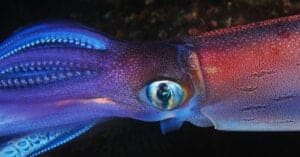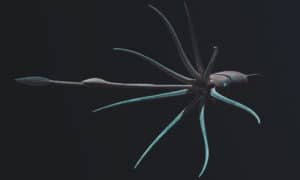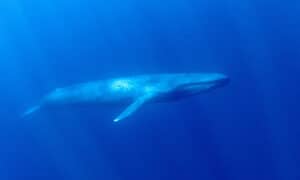Humans have been observing squids for countless years. They are present throughout literature, art, and culture. We can observe a common fascination with squids among people in everything from Aristotle’s antiquity to contemporary tales.
Squids’ predecessors, cephalopods, originally appeared more than 500 million years ago during the Cambrian period. Decapodiforms, Octopodiforms, and Nautiloids are the three superorders used by scientists today to categorize the cephalopod family. Squids are a part of the Decapodiform group. The size, way of life, and longevity of squid might vary depending on the species. While some squid are quite tiny, live in groups, and only survive for a year, others may grow to enormous sizes, weigh more than a ton, spend most of their lives alone, and live up to five years.
Even the elusive giant squid typically travel in packs when they are young. They consume other animal species and enjoy eating shrimp, fish, and crab. Both as predators and as prey, squid are crucial to preserving the ecosystem of the ocean. Additionally, they are quite numerous and exist everywhere in the world.
In this guide, we will break down what a group of squid is called, as well as how these groups work in terms of squid behavior.
What are Squid?
Oceanic cephalopods known as squids have most likely existed on earth for millions of years. They have been so adept at surviving that, unlike many other species that have evolved quickly to adapt, they have altered their bodies relatively little over time.
The squid you could come across now will resemble the squid from hundreds of millions of years ago in many ways. Squids have developed the capacity to blend with their environment, which helps them survive well. Even though there are more than 300 species of squid in the world’s waters, the majority of them use biological camouflage to grab prey and evade predators.
Squid are patient hunters while looking for food. They will sit in wait for a fish or other animal to swim by and then strike before it can flee using their natural camouflage. This is one reason why squids have endured for millions of years as such a successful species.
Squids are a significant predator and a source of prey for several other creatures since they have grown to be so essential to many ocean ecosystems. For instance, the giant squid, which sperm whales can catch by plunging hundreds of feet below the surface, is one of their primary food sources. Squids have colonized the majority of ocean habitats, from those nearer the surface to those at the very bottom of the ocean’s depths.
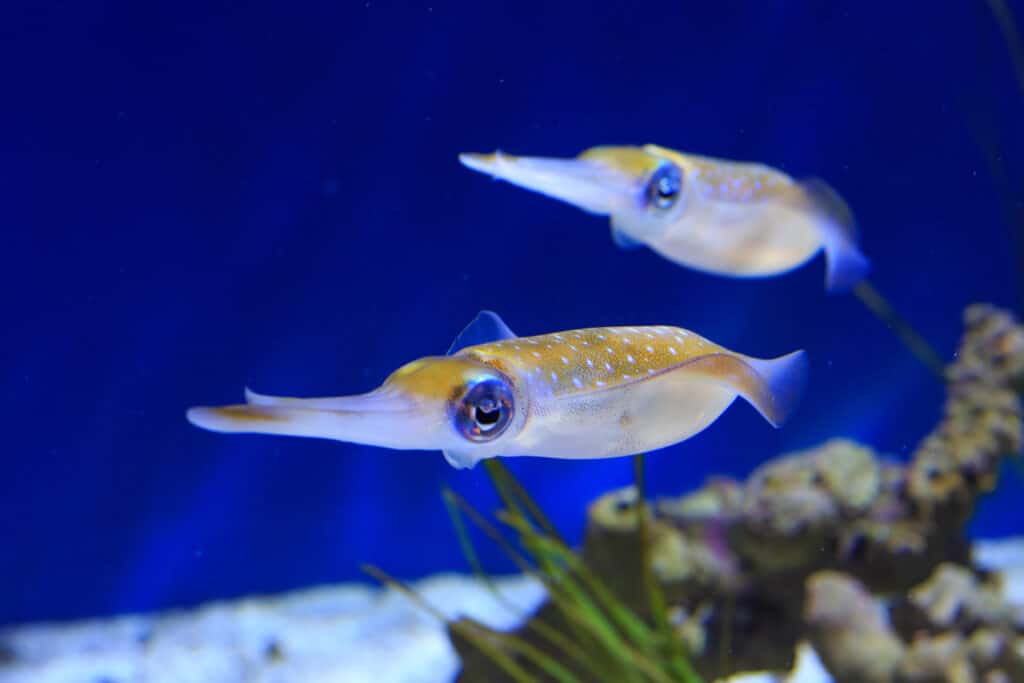
Squid (pictured) will often travel in small groups known as squads.
©Cassiohabib/Shutterstock.com
Squid Squads: All in the Family
A squad of squid is a better collective noun in the eyes of scientists than the terms “shoal” or “school” which are used to describe squid as well as other marine species like fish.
Over 300 species of squid, a type of marine mammal, can be found worldwide. They differ from octopuses because they have two long tentacles, eight legs (though some species have ten legs), and a triangular head.
Squid don’t have a reputation for having lengthy lives. The majority of them die a year or less after giving birth to their young. Some of them do, however, make it to five years. Squid typically wander in bunches and dwell in open water to defend themselves from predators. But since they are so large and do not have many adversaries, gigantic squid are notorious for generally leading lonely lives.
Squid populations or squads have grown quite quickly all around the world since 1950. Scientists have been unable to pinpoint the precise cause of this expansion and alternate between a number of theories, including human fishing methods and natural ocean cycles. However, nothing significant has yet been uncovered. According to research, if all of the people in the world and all of the squid in the water were to be weighed together, the squid would weigh more.
The Origins of Squid Squads
There’s a solid reason why a group of squid is referred to as a “squad,” despite the fact that it may appear a little casual. And no, it’s not simply because “squid squad” is a catchy phrase. However, that is a fair enough excuse in and of itself!
Squid groups have earned the nickname “squads” because of their propensity to travel in close formation. This will increase their ability to catch prey if they come upon it and help them keep an eye out for predators. By establishing a precise configuration and coordinating their camouflage to fend off other predators that may be chasing them, traveling in groups also aids in their ability to go unseen.
In essence, a group of squid resembles a group of troops or soldiers. They are a close-knit group, and each member has a specific job to do to ensure the group’s existence. They can hunt more successfully and live in the wild because of their close-knit formations. Squid don’t travel in groups as much as you may believe, though. As mentioned earlier, they are often very solitary creatures.
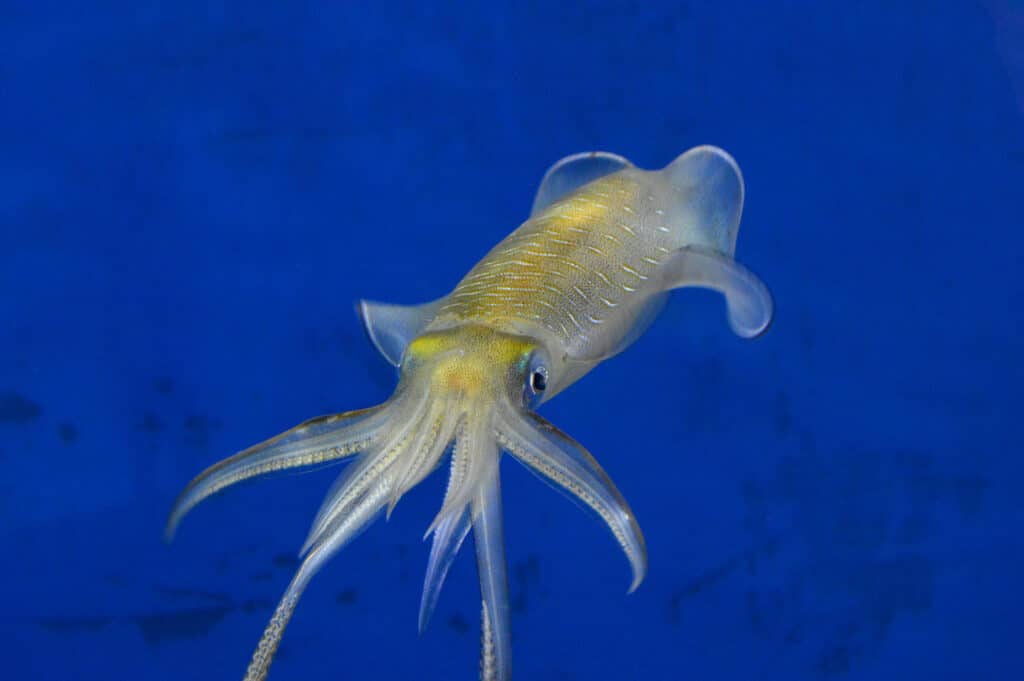
Adult squid (pictured) rarely travel in squads, but will group together when young for protection.
©iStock.com/kororokerokero
Squads of Squid in Popular Culture
Squid is popular in different types of cuisine, including Italian cuisine. Calamari is a type of Italian dish that is popular around the world. The squid is breaded and deep-fried in order to make this tasty dish. Italian and Spanish cooks use squid in virtually everything, from soup to pasta. Squid that has been barbecued is also popular with noodles and rice in several Asian cultures.
Ancient Greeks also loved squid, especially the enormous varieties. Greek mythology contains several intriguing stories of them. Numerous well-known writers have since described them, including Aristotle who wrote about squid in the 4th century B.C., Jules Verne who painted them as sea monsters, and H. G. Wells who once wrote about a man-eating squid in one of his short tales.
Is Shoal Another Word for a Group of Squid?
Technically, yes. An aggregation of squid is sometimes referred to as a shoal. A boing boing of squid, a conspiracy of squid, and an audience of squid are a few more unusual alternative titles.
Fish, seahorses, and porpoises are also referred to as a shoal. Squid are closely related to octopuses and cuttlefishes and are essentially mollusks (a.k.a. cephalopods). However, unlike the majority of squid species, octopuses and cuttlefish live alone and lack a recognizable social structure.
What is the Word for a Group of Giant Squid?
Despite the fact that giant squid prefer to live alone, a group of them is known as a shoal of squid, school of squid, or squid squad, just as other squid species would be called.
One of the largest marine creatures in the world is the giant squid. They may weigh more than a ton and grow up to 45 feet long, tentacles included. Despite their reputation for living alone, giant squid travel in packs when they are young and during mating season. Following that, they break away from the group and live the remainder of their lives alone, never encountering another member of their own species. Since there are no possible predators where they reside, the deep water is a comfortable place for them.
Giant squids are thought to have a lifespan of up to five years and only mate once. They are carnivorous and have a significant impact on the ecosystem of the ocean as both prey and predators. They enjoy eating tiny fish, shrimp, and crab, among other items. Squid are fierce and patient predators; they sit quietly and maintain their composure until the prey is within their reach. Then they just munch the victim into pieces and eat it alive after they’ve captured it. Surprisingly, some squid species also have venomous saliva.
Are Giant Squid Ever Prey?
Squid are among the most skilled predators in the water. But despite their strength, they often become prey to other creatures. The largest predators of a school of squid or even a gigantic squid are thought to be sperm whales. In addition, squid are also eaten by dolphins, sharks, seagulls, seals, and many whale species. To avoid these predators, little squids tend to travel in groups and adopt counter-illumination strategies to conceal themselves. Others use the lights produced by symbiotic bacteria to hide in the water while some of them spew ink at the predator.
Do Male Squid Live in Squads?
Yes, male and female squid will occasionally travel in squads. They will also get together periodically to mate. Most species of squid only breed once a year. However, others do it more frequently. The mating process begins when a male and female squid encounters each other in the open sea and frighten off any potential rivals. The female squid will lay her eggs, which weigh around 15 pounds, in either open water or among plants on the ocean floor. These aquatic creatures do not require care from the mother squid because they are born with all they need to survive, instincts included.
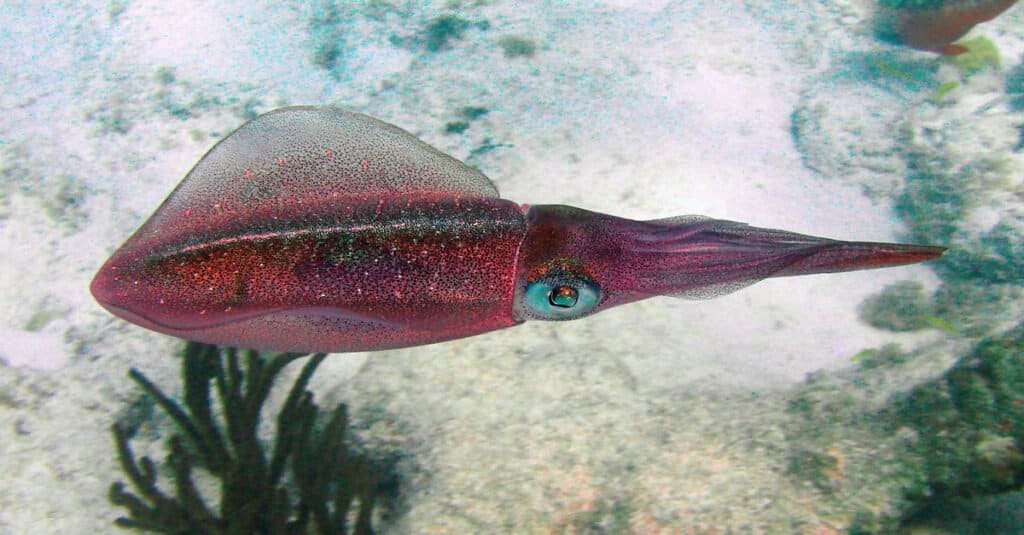
Squid (pictured) only really travel together in squads when they are young or looking to mate.
©Ernie Hounshell/Shutterstock.com
How Many Squid Live in an Average Squad?
There is no definite answer to this question, as squid tend to live alone more than in groups. However, groups of squid (or squads) do occur in nature, but the numbered range of how many squids are typically in a squad is inconclusive. It’s likely that the size of squid groups varies quite a bit, from just a few squids to many.
For safety, defense against siege, mating, travel, and hunting, squid prefer to reside in bigger squads, schools, or shoals. But bear in mind that they often start schooling when they are young and not yet ready to breed. Once they are of age to breed, adult squid will tend to avoid traveling in groups.
Giant squids also tend to live alone. They hunt alone and live incredibly brief lives. Younger and smaller squids, however, like to travel in packs. because their life depends on protection. Giant squid only have one major natural predator (the sperm whale) and rarely fall victim to them because of their size and strength. But while young and small, they will travel in squads to protect themselves until they are large and stronger.
Conclusion
Squids have been around for millions of years and are one of the most adaptive creatures on the planet. Although squid squads have been present for a very long time, little biological change has occurred. This indicates that, as a whole, squid are a very successful group of animals, and recent population patterns have served to support that claim.
To summarize, squid will often migrate in groups called “squads” in the water. You may use the terms “shoal” or “school” to describe a group of squid if you’d like, but those terms are used to refer to marine animals in general. The phrase “squad,” on the other hand, exclusively refers to a group of squid.
Researchers are still in awe of these odd small creatures’ capacity for survival and hunting. Because of their innate ability to blend in with their environment, they are better able to hunt and are protected from possible predators. They are simply remarkable beings!
The photo featured at the top of this post is © Circe Denyer / Creative Commons – License / Original
Thank you for reading! Have some feedback for us? Contact the AZ Animals editorial team.



